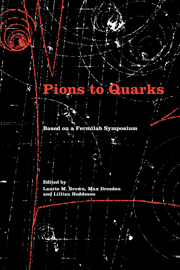Book contents
- Frontmatter
- Contents
- List of contributors
- Foreword by Leon M. Lederman
- Editors' acknowledgments
- Photographs of the symposium
- List of abbreviations
- List of notation
- I Introduction
- II Particle discoveries in cosmic rays
- III High-energy nuclear physics
- IV The new laboratory
- V The strange particles
- VI Weak interactions
- VII Weak interactions and parity nonconservation
- VIII The particle physics community
- 34 The postwar political economy of high-energy physics
- 35 The history of CERN during the early 1950s
- 36 Arguments pro and contra the European laboratory in the participating countries
- 37 Physics and the excellences of the life it brings
- 38 Social aspects of Japanese particle physics in the 1950s
- IX Theories of hadrons
- X Personal overviews
- Name index
- Subject index
36 - Arguments pro and contra the European laboratory in the participating countries
Published online by Cambridge University Press: 07 May 2010
- Frontmatter
- Contents
- List of contributors
- Foreword by Leon M. Lederman
- Editors' acknowledgments
- Photographs of the symposium
- List of abbreviations
- List of notation
- I Introduction
- II Particle discoveries in cosmic rays
- III High-energy nuclear physics
- IV The new laboratory
- V The strange particles
- VI Weak interactions
- VII Weak interactions and parity nonconservation
- VIII The particle physics community
- 34 The postwar political economy of high-energy physics
- 35 The history of CERN during the early 1950s
- 36 Arguments pro and contra the European laboratory in the participating countries
- 37 Physics and the excellences of the life it brings
- 38 Social aspects of Japanese particle physics in the 1950s
- IX Theories of hadrons
- X Personal overviews
- Name index
- Subject index
Summary
Although some of you already know about the CERN history project, please allow me a few words of description. Like the object of our study, the history team is supranational: John Krige from the United Kingdom, Ulrike Mersits from Austria, Dominique Pestre from France, and myself from Germany. The funding comes from science foundations in several European countries. CERN is not financing the project, but provides offices and other help.
Our results are being issued in a series of reports called Studies in CERN History, to stimulate criticism and discussion before the final manuscript is produced. The prehistory, up to the official foundation of CERN on 29 September 1954, is nearly finished and will be published as the first of two volumes.* One part is an analysis of the emergence of the idea to create a European laboratory from scientific needs and the desire for European unity. The two principal champions who struggled for the laboratory were Pierre Auger and Edoardo Amaldi. Amaldi's account at this symposium is included here as Chapter 35.
The present chapter is based on an analysis of the decision-making process in four of the participating countries – the studies by Krige for the United Kingdom, Pestre for France, Lanfranco Belloni for Italy, and Hermann for Germany. The work is based (as are all the studies of the team) on source material in many governmental and private archives, as well as in the CERN archives, and will form part of the first volume of CERN's history.
- Type
- Chapter
- Information
- Pions to QuarksParticle Physics in the 1950s, pp. 519 - 524Publisher: Cambridge University PressPrint publication year: 1989



